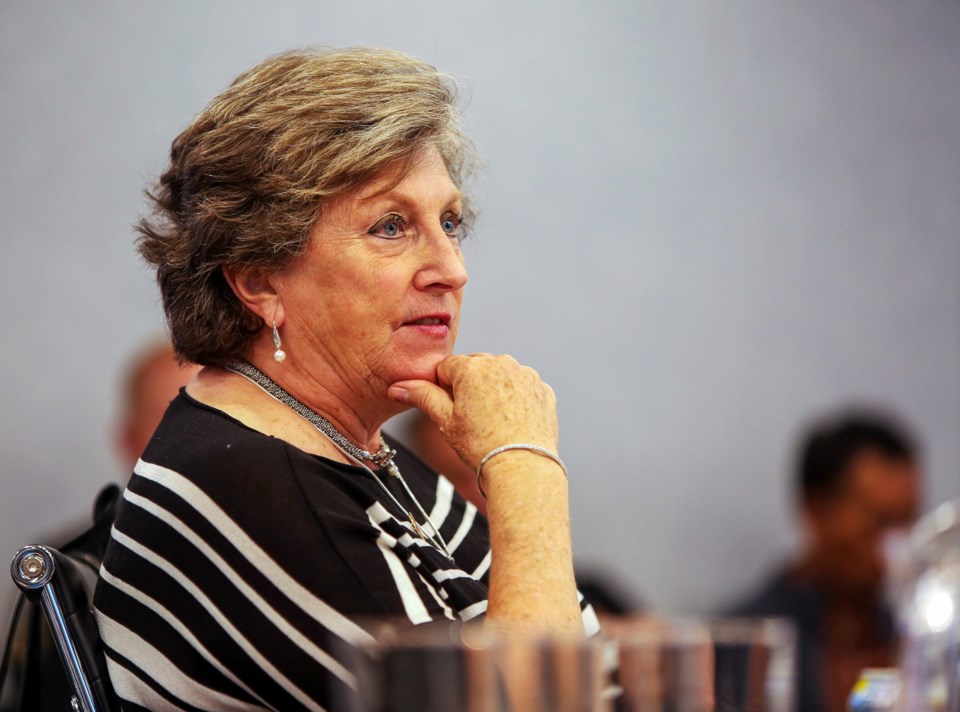A high-profile member of the Vancouver Police Board who resigned Jan. 30 has gone public to explain the reasons for leaving her post on the independent civilian oversight body of the police department.
In a written statement provided to Glacier Media Tuesday, Faye Wightman alleged interference in board matters from Mayor Ken Sim’s political staff, a “flawed” governance structure and concerns about potential conflict of interest related to two board members.
“I believe the governance structure at the Vancouver Police Board is flawed, and it was becoming increasingly clear that the best interest of the board itself, the public at large, and the Vancouver Police Department was at risk,” said Wightman, who served more than three years as vice-chair of the board.
“I felt compromised continuing as a director when I could see flaws in the system that were detrimental to effective governance.”
Wightman didn’t name the board members or the mayor’s staff in her statement.
But in a brief interview, she identified Patricia Barnes, the executive director of the Hastings-Sunrise Business Improvement Association, and Lorraine Lowe, who was recently appointed executive director of the H.R. MacMillan Space Centre Society. Lowe takes on her new role in March.
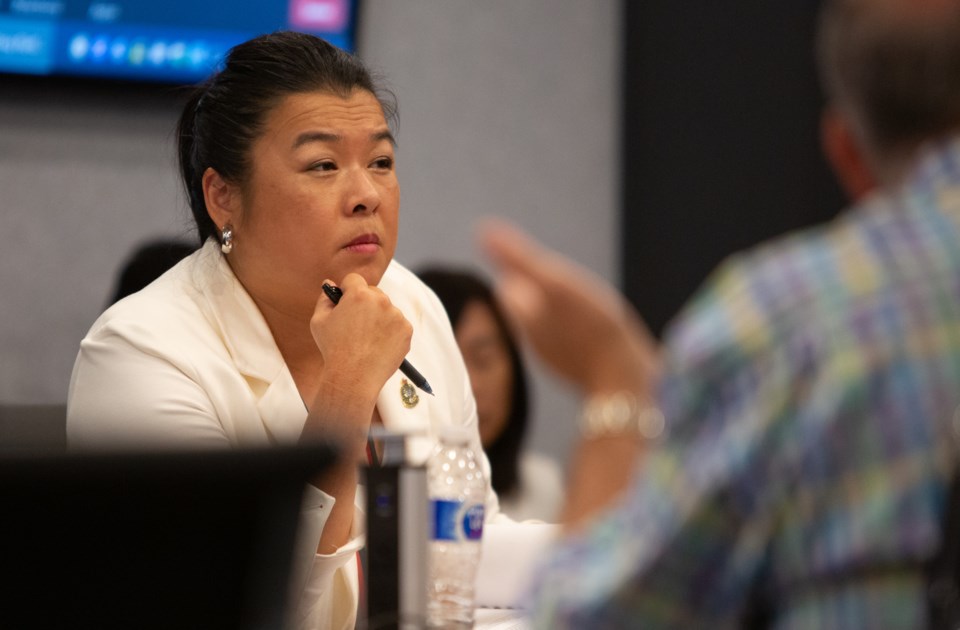
'A position of conflict'
Wightman said the business association and space centre receive funds from the city.
“If the board is comprised of directors who have a professional reliance on the City of Vancouver for funding, or on maintaining a positive relationship with the mayor, who also chairs the police board, then their objectivity is compromised,” Wightman said in her statement.
“That is the case with two of our directors at the [police board] and it was becoming clear they were in a position of conflict.”
Wightman also named Trevor Ford, the mayor’s chief of staff, when asked about her allegation of interference from Sim’s staff. Sim doubles as chair of the police board, a role delegated under the Police Act when sworn in as mayor in November 2022.
“[Trevor Ford] came to an in-camera meeting, he phoned and directed board members to fire the executive director,” Wightman alleged in the interview.
“He sat in on one-on-one meetings that the mayor had with individual board members. If that’s not political interference, I'm not sure what is.”
Glacier Media has seen Ford at police board meetings but has not verified Wightman's allegations.
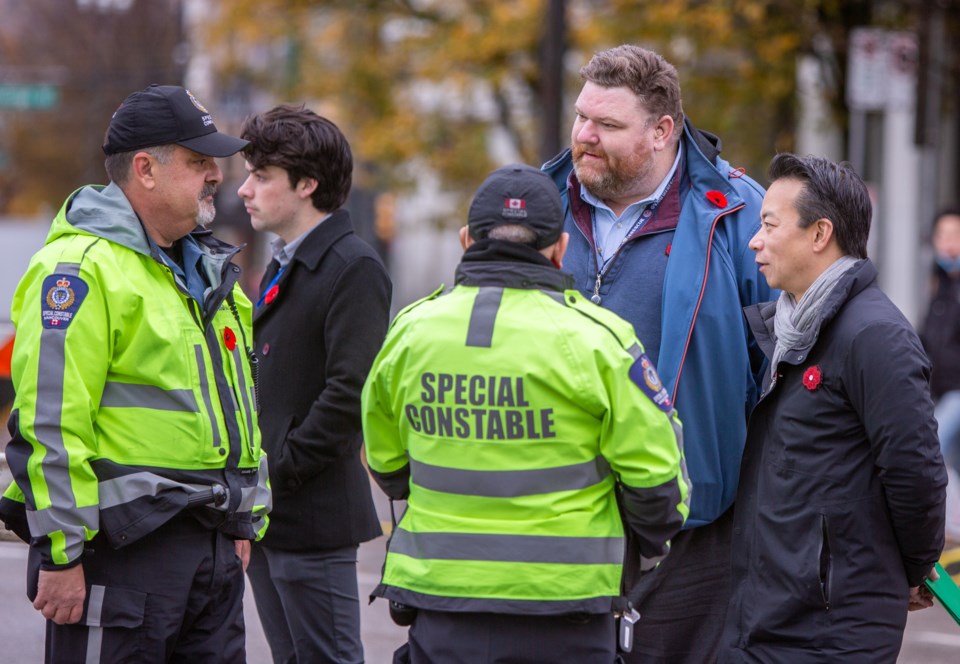
'Best interests of all Vancouverites'
Glacier Media contacted Ford about the allegations. He didn’t provide comment and instead responded with a written statement from Sim, which read:
“As chair of the Vancouver Police Board, I am fully committed to transparent and effective governance. In my role as chair, I am focused on serving the best interests of all Vancouverites. All decisions related to Vancouver Police Board personnel matters are at the sole discretion of the Vancouver Police Board.”
Reached by phone Tuesday, Barnes declined to comment on Wightman’s allegations, saying the mayor was the spokesperson for the police board.
But she pointed out that funds for business improvement associations are first collected via a city tax levy before being returned to the associations to “improve the neighbourhood and do grassroots economic development.”
“It's business money — it's our business members’ money,” Barnes said.
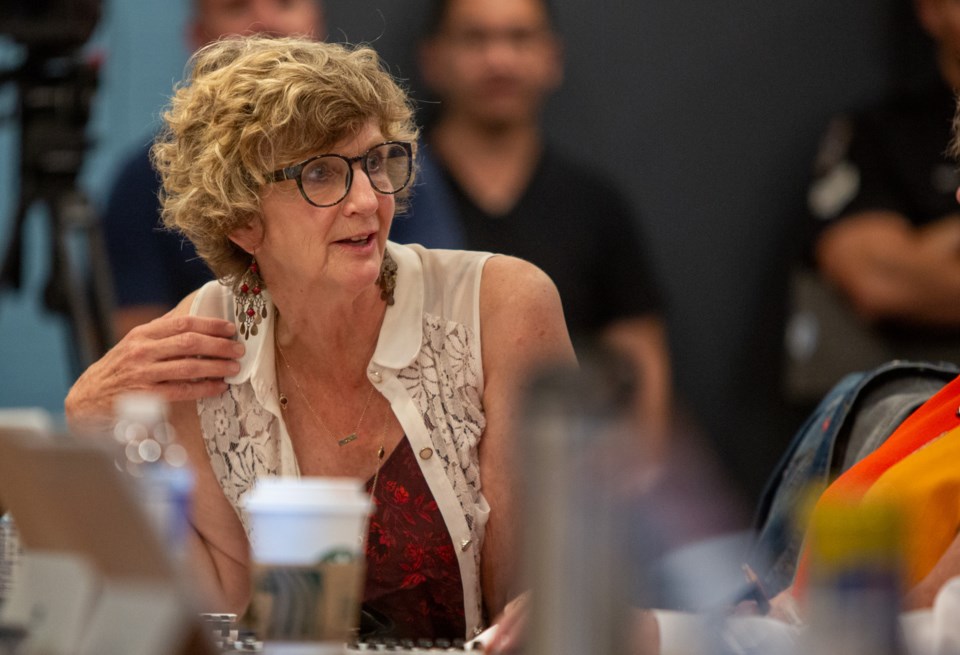
'Reject any insinuations'
Glacier Media left phone, email and direct messages via social media for Lowe, but she didn’t respond before this story was posted. Lowe will be leaving her post as executive director of the Dr. Sun Yat-Sen Classical Chinese Garden to join the H.R. MacMillan Space Centre Society.
The society receives the majority of its funds from the city and provincial government, according to the organization’s annual report. The Garden, meanwhile, is not funded by the city.
Frank Chong, vice-chair of the police board, provided Glacier Media with a written statement after learning of efforts made to contact Barnes and Lowe about Wightman’s allegations.
"As a matter of policy, we do not discuss the contents of in-camera meetings due to their confidential nature,” Chong said. “Furthermore, we do not discuss board personnel matters publicly. The Vancouver Police Board is an independent group of dedicated members focused on good governance.”
Chong continued: “All board decisions are made independent of political considerations. As a matter of good governance, any allegations of real or perceived conflicts of interest are appropriately addressed. We further reject any insinuations that decisions by the board are directed by the mayor’s office.”
'Lost sight of these key values'
Wightman noted in her statement that she had “a strong background in governance,” having graduated from the Institute of Corporate Governance, taken a number of governance courses and chaired boards and governance committees.
She also led several high-profile agencies before the provincial government appointed her to the police board in September 2020. Wightman served as CEO of the Vancouver Foundation, CEO of BC Children's Hospital Foundation, vice-president of University of Victoria and interim CEO of the Canadian Cancer Society.
“The board is guided by the values of independence, fairness, objectivity and accountability in all that it does,” she said in concluding her statement. “I believe the board chair and certain directors of the board have lost sight of these key values, and I resigned.”
Wightman’s departure comes less than a year after board member Rachel Roy resigned in June 2023. Stephanie Johanssen also lost her job as executive director in November 2022 after serving three years and seven months in the role.
The board’s interim executive director wouldn’t say at the time why Johanssen was no longer on the job. Johanssen also declined to comment on reasons for her departure.
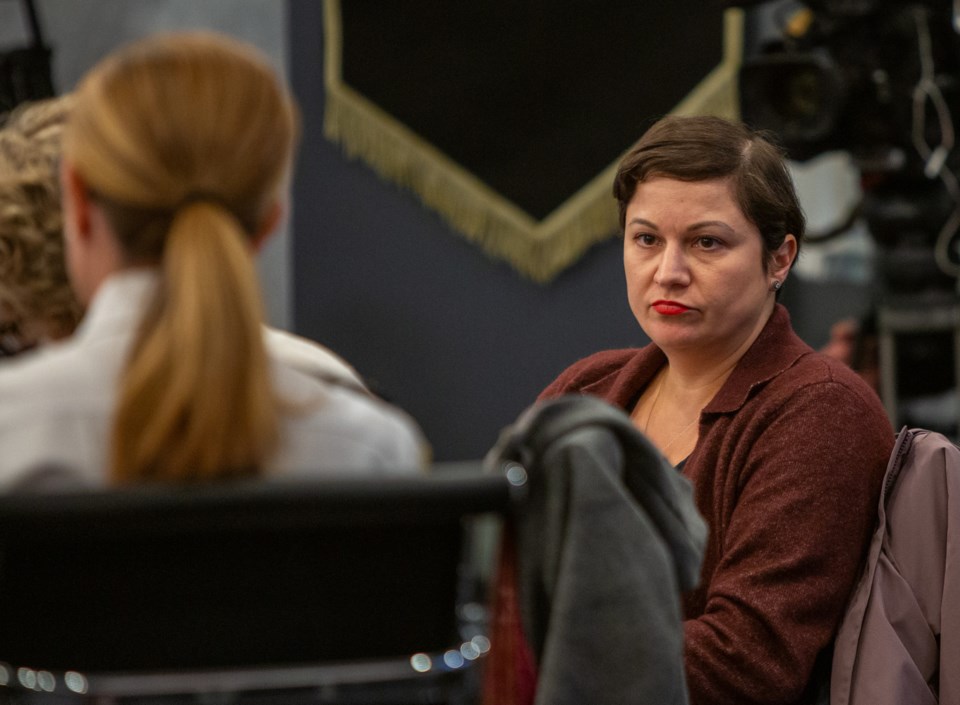
'Dereliction of our duty'
Roy, however, made her resignation public at a board meeting when she quit over an issue related to a promised vote on whether the school liaison officer (SLO) program would be reinstated in Vancouver schools.
The controversy involved Wightman, who had indicated that a vote would take place. She apologized at the time for what she described as a misunderstanding, saying the board in November 2022 had approved the VPD’s overall budget for 2023, which included funds dedicated to the SLO program.
Members of the Vancouver police’s African descent advisory committee walked out the meeting when Wightman announced there would be no vote. One member of the committee called what happened “a fiasco.”
Roy, who was a board member for more than two years, told reporters after the meeting that the board could have stopped the program. At a meeting in April 2023, she raised concerns over officers wearing guns — and raised the same point on the day she resigned.
“The breaking point today was when we were deprived of the opportunity to vote on this — we came here expecting that,” Roy said at the time. “A decision was made — apparently — that the board could not vote on this. It's a serious governance issue. In my view, it's a dereliction of our duty as board members under the Police Act.”
None of the board members are elected, with one person appointed by the city and the rest by the provincial government. Police Chief Adam Palmer and his deputy chiefs attend board meetings but are not members of the board.
Currently, there are six serving members, including Sim, who is not eligible to move motions and can only vote on an item in the event of a tie.
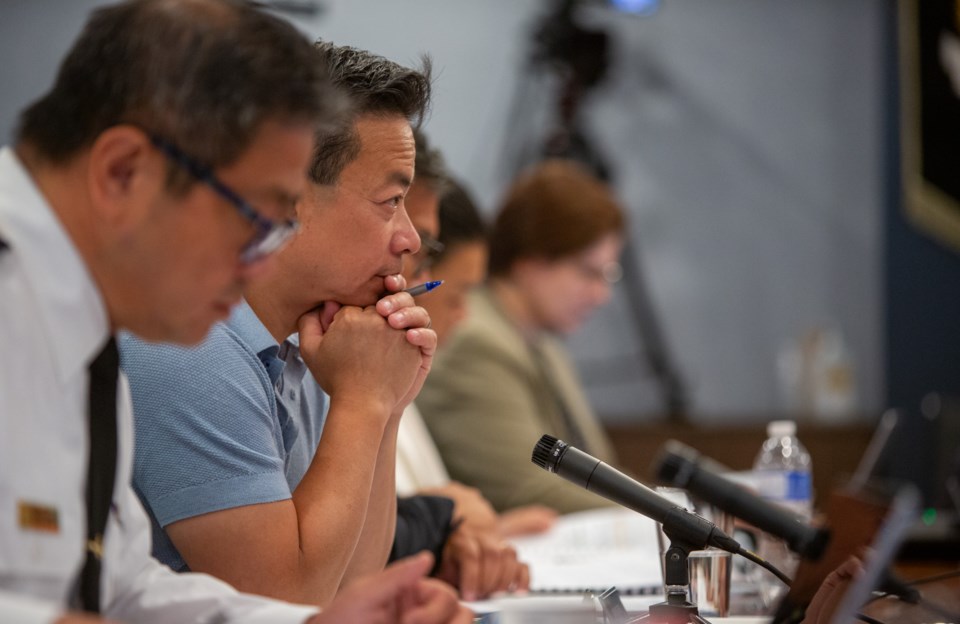
'A definite conflict'
Controversy connected to a Vancouver mayor serving in a dual role as chair of the police board is not new, as Glacier Media has reported over more than a decade.
Sim’s predecessors Kennedy Stewart, Gregor Robertson and Sam Sullivan all complained about the inherent conflict of having a politician on a board whose job involves approving (or cutting) budgets for the police department.
“There is a definite conflict that happens with the mayor trying to represent the broader budget and also representing the police,” Sullivan told the Vancouver Courier in 2008. “Certainly, I feel the tensions regularly.”
In fact, both Robertson and Sullivan requested the Police Act be revised to prevent an elected mayor from becoming chairperson of the police board.
The relationship was also highlighted in the Stanley Cup Riot Review in August 2011. The authors said Robertson told them the requirement to become chairperson of the police board “is not good governance.”
“The mayor’s responsibilities could be better exercised if he or she was dealing with the police board, and not directly with the chief as chair of the police board,” the review concluded.
The board is the employer of the police department and responsible for hiring a chief. The board also approves the VPD's budget before it is sent to city council for final approval. Setting policy and responding to public complaints are other responsibilities of the board.
The board’s next public meeting is scheduled for Feb. 29 at the VPD’s Cambie Street precinct. It begins at 1 p.m.
Note: Since this story was posted, Trevor Ford contacted Glacier Media to say he wanted to go on record about allegations made against him. He said he attended an in-camera meeting of the police board in January, but that it was at the invitation of the entire board, including Faye Wightman.
He also said he never ordered any police board member to fire the board's executive director, Jason Kuzminski, who remains on the job.
"It's not my job," Ford said. "I absolutely never directed anyone to fire somebody. I know the boundaries and I respect the different governing bodies. So to be clear, I never demanded someone be fired."
